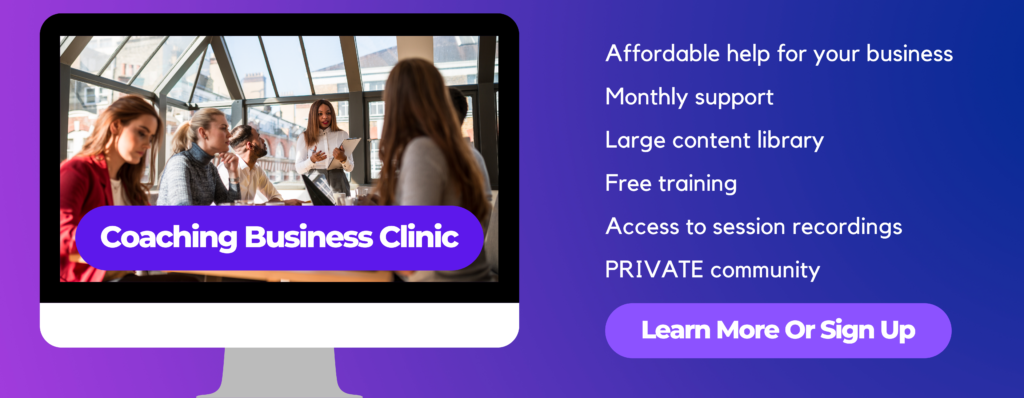
Are you tired of wasting your coaching ads budget? Perhaps you’re the lucky one who hasn’t wasted any budget yet, or you are the kind of entrepreneur who likes to plan well instead of experimenting. This article is for coaches who have a budget set aside for coaching ads and want to figure out the best way to reach their audience with a proper marketing strategy to reach their ideal client.
What Should You Consider For Coaching Ads
While everyone is jumping on YouTube ads, Instagram ads, and all the other trending platforms like TikTok, Snapchat, Twitter, etc., a lot of the budget for Facebook coaching ads and other coaching ads is wasted on “boosted posts” and other ads that were poorly planned and executed. Before you invest in any marketing for coaching ads, invest in clarity on where your audience “hangs out” and which mediums would resonate the most with them.
For example, if you were targeting the elderly, certain digital platforms are unlikely to hit a large percentage of that demographic. You may get a few clients, but you want to maximize your results for every ad dollar you are spending and reach your ideal target client with your coaching ads.
Be Prepared To Include A Learning Budget
On the other hand, you have to be prepared to spend some “learning budget” on letting coaching ads run to gather data that will allow you to learn how your ad can be modified to be more effective. Most ad platforms or social media ad services will provide a recommendation for how long you need to give an ad to see what works and what doesn’t so you can fine-tune your campaign for maximum performance.
The key here is to make sure you are not overspending on your learning budget. If you do this, you won’t be able to optimize your ads effectively. The goal should always be to find the right balance between the two budgets so that you can get the maximum return from each investment.
First of all, the biggest mistake small businesses make when investing into advertising for the first time, is thinking that the only money they’ll spend is on simply displaying the ad on their preferred platform.
They design an ad and define an audience that is very broad, even after narrowing it with the help of the audience score most platforms provide. Or they fall for the option to simply turn their last social media post into an ad to increase exposure.
Why not? It’s ony a couple of bucks. Can’t hurt, no?
Maybe spending $20 a week on this nonsense is not a big loss for you, but it’s a waste of money. You might as well crunch up a twenty and throw it away.
The second mistake coaches and small business owners make when they consider advertising to generate leads is not planning adequate learning budget. The first mistake is inadequate planning (e.g. target audience, compelling offer, CTA (call to action), great copy, etc.).
But let’s return to the learning budget. That’s the money your ad needs in order to gather enough data to learn about the audience. That’s what will tell you what works and what doesn’t work so you can draw some conclusions and optimize.
Gathering quality data takes time and money. Both are tied together – here’s how:
- Obviously, you need a weekly budget. The longer you run the ad, the more you’ll spend.
- If you want to get more accurate intelligence from your initial experiment, you’ll need to get more exposure.
- More exposure = more money spent to reach a wider audience and/or running over a longer time to have enough data gathered over weekends vs weekdays. That way, you can detect patterns.
This initial budget is not money that will bring you instant customers. It will mostly give you insights to optimize your ad before you launch a version that will have higher chances of success.
Popular Advertising Campaign Types
If you are new to paid advertising, it’s important to know that there are different types of advertising campaigns available. These include:
Display Ads – These are the most common type of online advertising. They appear as banners, text links, images, videos, and popups.
Search Engine Optimization (SEO) – SEO refers to optimizing websites to rank higher in search engines such as Google. It includes things like keyword research, content creation, backlinks, and website optimization. Paid search ads like Google Ads also allow you to get ranked higher in search results without the more laborious work of organic SEO since Google Ads are paid placements.
Social Media Marketing (SMM) – SMM involves using social networks to promote products and brands. It also includes things like Facebook advertising, LinkedIn marketing, and influencer marketing.
Email Marketing – Email marketing allows companies to send targeted messages to customers. Companies use email marketing to build relationships with potential clients, increase brand awareness, and drive sales.
Mobile Advertising – Mobile advertising uses mobile devices such as smartphones and tablets to display advertisements.
Video Advertising – Video advertising is becoming increasingly popular because it offers businesses a great opportunity to connect with consumers as you share your expertise, or entertain your audience to build rapport and become the go-to resource for specific topics.
Affiliate Marketing – In affiliate marketing, advertisers pay affiliates when someone clicks on their referral links or banners to purchase a product.
Referrals – Referral programs reward friends and family members for bringing new customers to your business.
Remarketing – Remarketing is similar to retargeting, except instead of showing ads to people who already visited your site, you show ads to people who visit sites that are similar to yours.
Content Marketing – This form of marketing focuses on creating valuable content that is useful to readers. This usually includes blog posts and video content.
Influencer Marketing – Influencer marketing is another way to market your business. Instead of paying celebrities directly, you partner with them to help spread your message.
Ads Are Not Your Ultimate Solution To A Lack Of Clients
You may think that if you just spent enough money on advertising, then all of your problems would be solved. But this isn’t true at all. A lot of coaches waste their marketing budget because of this assumption. As mentioned earlier, your success also depends on the validity and presentation of your offer:
- Is your offer in demand? Does it fulfill an important need for your target audience?
- Is your offer communicated in a way that is compelling and clear?
- Is your offer priced to match your target market? Not too low (yep!) or too high?
You still need to work effectively to attract clients. And even though you’ve invested a lot of time and money into advertising, you’ll still need to constantly learn and adjust to the market and the data you track week to week to get the results you want. Advertising is not a one-and-done or a set-it-and-forget-it strategy. It takes consistent monitoring and improvement. That includes the ad itself, and what happens after an ad link is clicked, because that will determine if the expectations you have set with the ad are met.
A Word Of Caution Regarding “Results”
Many coaches we speak to get bombarded with offers from agencies who want to help them with ads. Not a bad idea, but make sure you carefully select the right expert or agency.
Hire a marketing professional who specializes in the ad category you are interested in and interview them to see if they understand the service you offer and the value you bring. Let them pitch their approach to you and compare a few experts before you hire someone.
Make sure you only sign up with a marketing consultant or with an advertising agency that can bring meaningful results. For example, merely promising views of your ad or clicks is not a meaningful result if you want to drive conversion. To prepare yourself, create tangible business goals and explain to the marketing consultant or advertising agency you work with:
- what coaching clients you want to attract,
- what coaching services you want to promote,
- how advertising fits into your overall lead funnel,
- how long your marketing campaign will run initially,
- what advertising budget you have available,
- what results you expect from a marketing campaign,
- what support or advice you expect from your marketing expert,
- how the marketing agency will be held accountable and how often you expect updates.
Also, ensure that you speak to former or current clients who are coaching business owners like you to hear how they have been helped by the expert you plan to hire. A lot of money has been lost to “quick results” agencies who simply employ bots to generate the clicks you signed up for, leaving you without clients and with meaningless clicks you pay for.
Don’t Neglect Traditional Paper Promotion
Depending on your niche, ready-to-share print collateral like a brochure may work better than digital coaching ads. Especially when your service is hyper-local and you can place flyers or posters with local partner businesses.


